Emma Donoghue's 'Room' took an Oscar for actress Brie Larson in 2016, can her latest 'The Wonder' do likewise?
In the new film version of Emma Donoghue's richly absorbing novel 'The Wonder,' we confront what the march of history and colonialism has done to Ireland. But there's more to it – much more – than that.
'The Wonder' opens in 1862, ten years after the Great Hunger, in a windswept midlands village where a local girl called Anna O'Donnell (Kila Lord Cassidy) is somehow hale and hearty after forty days of refusing food since her eleventh birthday.
Asked how she survives she replies on “manna from heaven.” Understandably, local law and church authorities want to investigate the veracity of her dramatic claims, for their own sometimes hidden reasons.
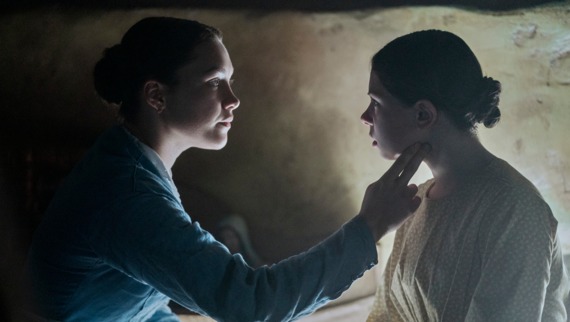
Florence Pugh as Lib Wright and Kila Lord Cassidy as Anna O'Donnell in The Wonder
Wright is played by Florence Pugh, 26. A no-nonsense professional, we quickly observe that Wright has the ideal characteristics for the job. She is careful, watchful, measured, and calm, a roll-up-your-sleeves type who stands in stark contrast to the supernatural circumstances.
Pugh is dependably sensational in the role, resisting the temptation to showboat or tilt the proceedings over into melodrama, a temptation that is also resisted by director Sebastian Lelio from the outset.
To my surprise the actors break the fourth wall at the very start of the film, making it clear they are on a film set and that what happens will be portrayed by actors playing roles, instantly placing a critical distance between the unfolding story and the viewer, making us assess and reassess what we're seeing as the film screens.
It's an interesting rug-pulling decision that says keep all your critical faculties, suspect too much sweet talk, and don't be too beguiled by the irresistible lure of stories. Especially perhaps if you want them to be true, despite everything you have seen beforehand.
This is provocative stuff and the story 'The Wonder' tells is based on the real-life 19-century phenomenon of “fasting girls” in Ireland where young women claimed to be able to survive without eating for months. It was God's love or manna from heaven that kept them alive, they claimed.
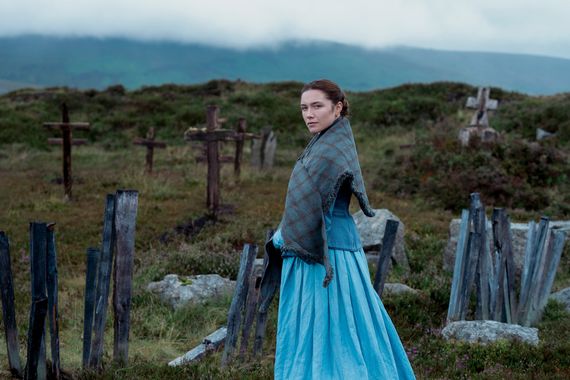
Florence Pugh in The Wonder
The O'Donnell's house is located in a bog where the eye struggles to settle on something solid other than their house. It's the perfect setting for a clash between faith and reason and as it turns out between overweening male arrogance and female practicality.
In the foreground, we see a fairly straightforward struggle between scientific rationalism and religious superstition, but behind it, there are centuries of backstories at play. Ireland was occupied by not one but two invading foreign armies, the film quietly reminds us.
Yes, we were famously subjugated by the English, but what about Rome? Is an invasion not an invasion if it happened much earlier and never quite ended? Is it still an invasion if you no longer notice it as easily as you might a British soldier?
Subjugation of many kinds are explored in the film. The first is the most explicit, the all-male committee of local leaders and clergy who have contracted Wright to watch Anna is a reminder of who holds the power and the purse strings. It's a reminder too that in this country freedom starts and ends at the long table of a bunch of men with the power of life and death over you.
In her investigation, Wright examines Anna's health, which to her surprise seems robust after 40 days of refusing all food. She sees no evidence of any physical decline, weight loss, or even dehydration in the girl and she keeps an open if skeptical mind about what she's seeing.
But Ireland is as strange to her as the supposedly supernatural doings that she's been contracted to investigate, we soon discover. Local people retain a suspicion of her motives and of her English origin, keeping their distance and their own counsel.
As the English do, Wright is initially insulted by their surly remoteness, failing to understand or even know about the long history of her countrymen in the still subjugated nation.
When she meets the London-based journalist Will Byrne (played by Tom Burke) we see the first glacial crack in the local resolve. Tom may have a new career in England but he once hailed from these parts and he knows the people. From the outset, he dismisses the case as a fraud but he finds he can't get Wright to share what she has observed from a much closer distance.
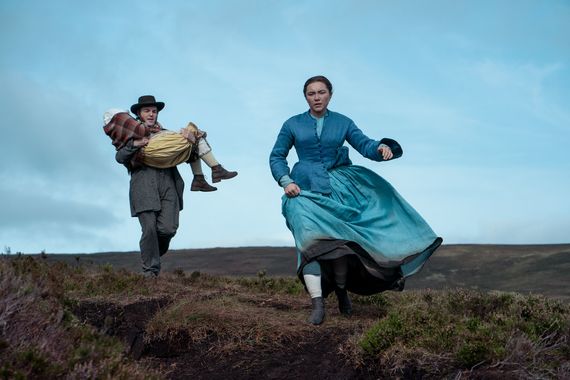
Kíla Lord Cassidy, Tom Burke, Florence Pugh
At root 'The Wonder' is about the power and the danger of stories, the ones we are told and the ones we tell ourselves. If at times toward the end it seems to tilt over into gothic levels of dysfunction the director and cast are there to gently pull it back, to diffuse some of the more hysterical moments, and guide the film toward a deeper understanding of the characters and events.
This isn't the jump scare film that the 'Room' often was, but it is ultimately richer and more absorbing. Pugh carries the film with an inner resolve to throw light not just on the circumstances but the future, a resolve that she inspires in others.
Unfortunately, the film and the screenplay seem to periodically lose interest in some of its themes and characters. I would have liked to know more about Dr. McBrearty's (Toby Jones) hidden fanaticism and the way in which it unmoors his focus.
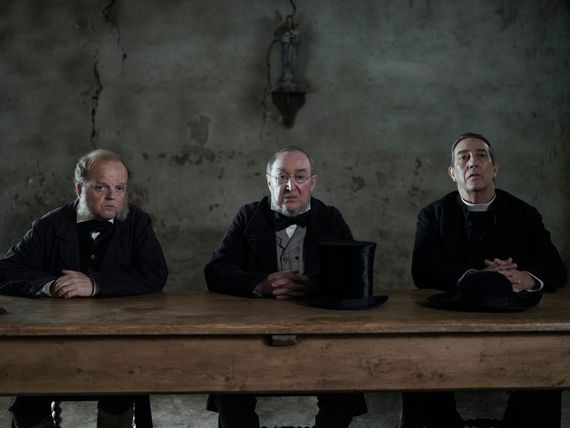
Toby Jones, Dermot Crowley, Ciarán Hinds in The Wonder
These fantastic actors are criminally underused throughout, although we garner they are there to highlight how little room women like Lib and girls like Anna have to maneuver in this world controlled by men.
Stories can liberate, stories can kill, which ones you tell and which are retold make all the difference in the world, the film reminds us, and whatever you do, don't get trapped in one yourself.
It's a shame that 'The Wonder' loses some of its momentum after it resolves its central paradox, but then it reminds us that the real stakes are the ones that women experience in a man's world. The horror in this film is real.
'The Wonder' will be available on Netflix on November 16.
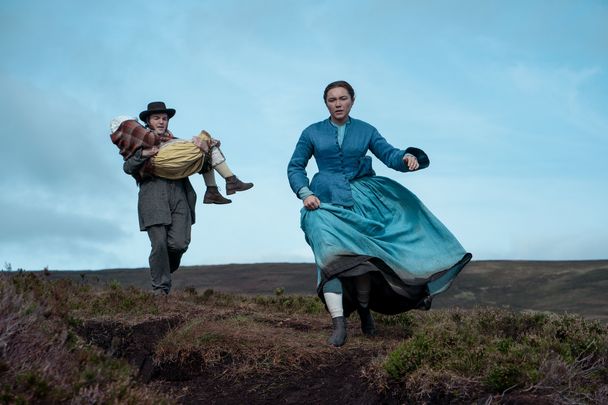



Comments